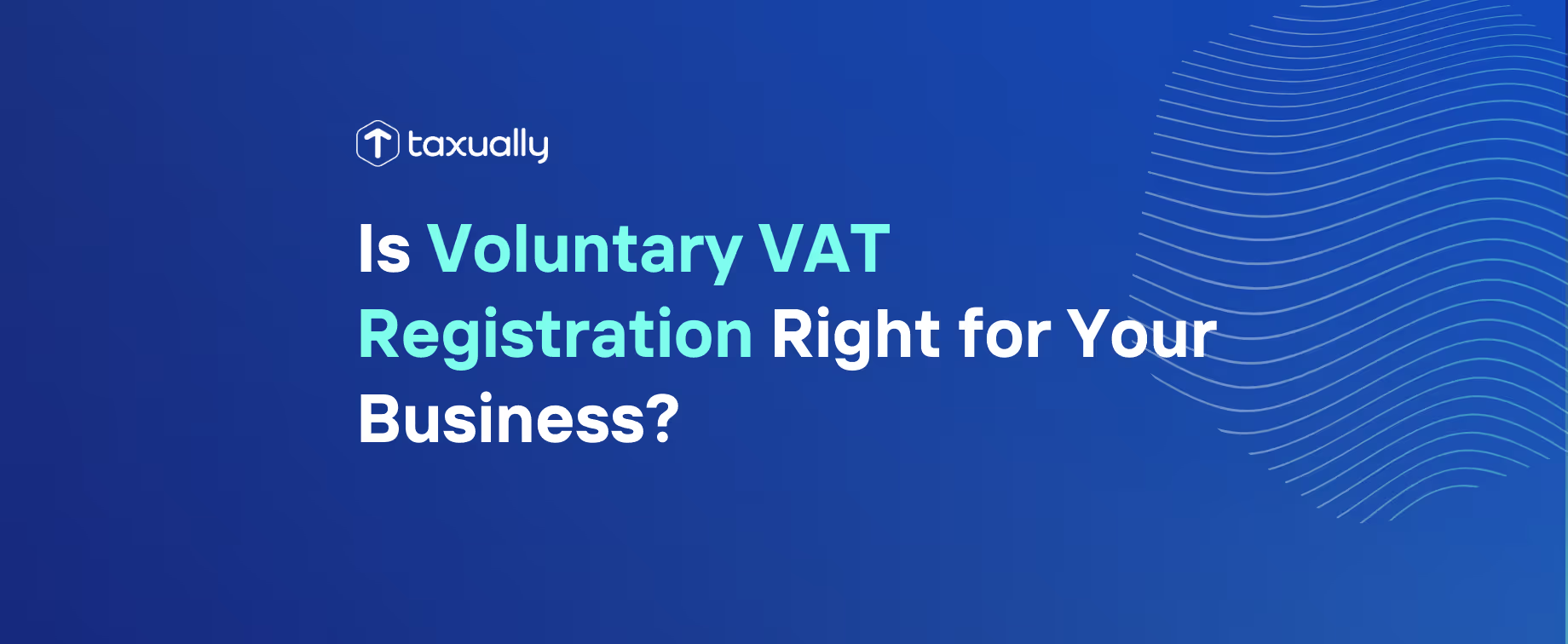Key takeaways
- Gain financial and reputational benefits: Voluntary VAT registration lets businesses reclaim VAT on expenses and enhances credibility with clients and partners.
- Be prepared for added responsibilities: Registration increases administrative tasks, compliance obligations, and potential cash flow pressures.
- Choose strategically: The decision depends on your customer base, growth plans, and ability to manage VAT reporting—seek professional advice before committing.
Sooner or later, most businesses will have to deal with VAT, although the when doesn’t always have to be out of your control. While VAT registration is compulsory for businesses exceeding a certain turnover threshold in many countries, voluntary VAT registration is an option that smaller businesses or those under the VAT threshold might consider. Understanding the pros and cons of this decision is crucial for entrepreneurs looking to make informed choices that best suit their business model and financial strategy.
What is voluntary VAT registration?
Voluntary VAT registration means that your business registers for VAT even if its annual turnover is below the mandatory VAT registration threshold set by the tax authorities in the country where you’re selling. This decision allows a business to charge VAT on its sales and reclaim VAT on its purchases, a move that can have significant financial and operational implications.
Pros of voluntary VAT registration

Reclaiming VAT on purchases
Perhaps the most tangible benefit is the ability to reclaim VAT on business-related purchases and expenses. This can lead to significant cost savings, especially for startups and small businesses with substantial initial investments in equipment, inventory, or services.
Enhancing business reputation
Being VAT-registered can enhance your business’s credibility and professionalism. It suggests a level of stability and scale, potentially attracting clients or partners who prefer or are required to deal with VAT-registered businesses.
Preparation for growth
Registering for VAT early can simplify the transition as your business grows beyond the compulsory VAT registration threshold. It helps in avoiding a sudden adjustment in pricing strategy and accounting practices, making the scaling process smoother.
Competitive advantage
If your business operates in a sector where most competitors are not VAT-registered, being able to reclaim VAT on your costs can give you a pricing advantage or improve your profit margins.
Cons of voluntary VAT registration
Increased administrative work
VAT registration comes with the responsibility of maintaining detailed records, issuing VAT invoices, and submitting regular VAT returns. This can increase your administrative workload or necessitate additional accounting support.
Potentially higher prices
If your customer base is primarily individuals or non-VAT registered businesses, adding VAT to your prices could make your products or services less competitive unless you absorb the VAT cost, impacting your margins.
Compliance risks
With VAT registration, you're under the purview of tax authorities with obligations that include accurate VAT charging, reclaiming, and reporting. Non-compliance, even if unintentional, can lead to penalties and audits.
Early cash flow considerations
Newly VAT-registered businesses might experience cash flow challenges, especially if there is a delay in reclaiming VAT on purchases or if customers are slow to adapt to the new pricing.
Should you opt for voluntary VAT registration?
The decision to voluntarily register for VAT is multifaceted, with implications that extend beyond mere tax compliance. For some businesses, the advantages of reclaiming VAT on purchases, enhancing business credibility, and preparing for future growth outweigh the administrative and financial considerations. For others, especially those in consumer-focused sectors with price-sensitive customers, the disadvantages may loom larger.
Businesses must carefully consider their specific circumstances, including their customer base, industry practices, and long-term strategy. Additionally, the evolving nature of VAT legislation, particularly in the context of changing trade relationships and tax laws, necessitates a proactive approach to compliance and financial planning.
Recommendations for businesses

Conduct a cost-benefit analysis: Assess the financial implications, including potential savings from reclaiming VAT and the impact on pricing and competitiveness.
Evaluate administrative capacity: Consider whether your business has the resources to manage the additional administrative requirements.
Seek professional advice: VAT regulations can be complex and vary by country. Consulting with a tax professional can provide tailored advice based on your business's specific circumstances and future plans.
Conclusion
Voluntary VAT registration is a strategic decision that requires balancing the potential financial benefits against the operational and administrative impacts. By carefully considering these factors, businesses can make informed choices that support their long-term growth and success. Whether voluntary VAT registration is right for your business depends on a myriad of factors, each unique to your business's trajectory and the markets you serve.
Do you need help with your VAT compliance? Book a free call with one of our VAT experts to find bespoke solutions for your business, optimize your VAT costs, and reach millions of new potential customers.
Frequently asked questions
New Year's Day - 1/1/2024Memorial Day - 5/27/20244th of July - 7/4/2024Labor Day - 9/2/2024Thanksgiving Day - 11/28/2024Day after Thanksgiving - 11/29/2024Christmas Eve - 12/24/2024Christmas Day - 12/25/2024
What is voluntary VAT registration?
Voluntary VAT registration allows a business to register for VAT even if its annual turnover is below the mandatory threshold, enabling it to charge VAT on sales and reclaim VAT on purchases.
What are the main benefits of registering voluntarily?
Businesses can reclaim VAT on expenses, enhance credibility with clients, and prepare for future growth by aligning early with VAT reporting requirements.
Are there any downsides to voluntary registration?
Yes. It increases administrative work, can lead to higher prices for non-VAT customers, and requires strict compliance to avoid penalties.
Who should consider voluntary VAT registration?
Businesses with significant startup costs, B2B clients, or plans for rapid growth may benefit most—though it’s best to seek professional tax advice before registering.



















